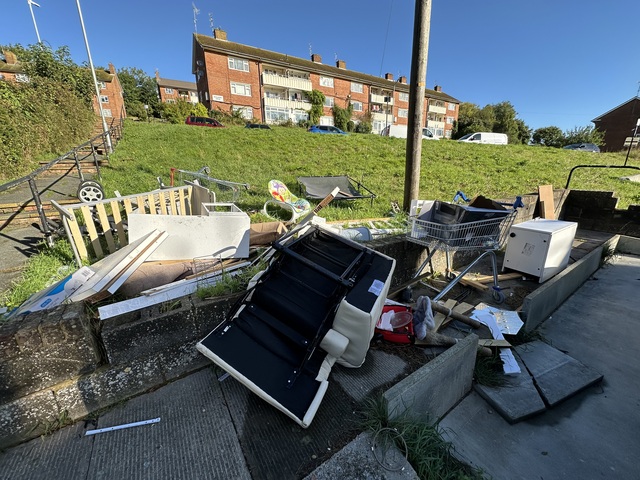Fly-tippers beware! Closed-circuit television (CCTV) monitoring is coming to a Brighton housing estate.
People living on the Bates Estate, off Lewes Road, have been calling for action to stop rubbish being dumped near their homes.
But overhead wires near two hotspots, by bin stores in Selsfield Drive and Thorndean Road, had hampered Brighton and Hove City Council’s housing team as they tried to find suitable sites for the cameras.
The two hotspots appear to have become a magnet for people dumping furniture, wood, paint and bulky waste.
At the council’s north area housing panel meeting today (Tuesday 19 November), housing estates manager Chloe Mclaughlin gave an update.
She told tenant representatives that she was checking suitable lampposts with access to a power supply and a view free from obstruction – and one had been found.
The council’s housing team has six mobile CCTV cameras which are moved around Brighton and Hove to try to tackle fly-tipping.
Cameras are likely to be deployed on the estate from next month or January.









Let’s hope they catch the person responsible. I hope the courts give them a huge fine at least. It’s a blight of our times
My experience is fines are the only way to go with these. Personally, I’d like to see the fines being used to purchase more cameras.
They do they are self funding
Pretty sure they’ve only had six for a while, be nice to see some more permanent ones on the hotspots.
So everything apart from the shopping trolley in that pile are domestic large items. This is not classic organised crime “fly tipping” where dodgy small waste companies charge for disposal and then dump illegally, this is domestic stuff that people cannot easily get rid of.
I know that the council will come and collect larger items, but at a cost. However many cannot afford this fee, so will assume that the best place for it is in the communal bins. The council as spent many years discouraging cars so people cannot get to the tip either. If you turn up at the tip in anything that looks like a commercial vehicle all manner of questions ensue.
Many people are on the breadline in this town so a fine is unlikely to have much effect as it simply cannot be paid.
I do note that this kind of rubbish increases at student changeover time, no doubt as stuff has been left in flats and shared houses. As these are businesses they should be stung.
In many countries there are free monthly collections of large items – it is illegal to put stuff out until collection day. Some item are recovered by other neighbors on this day for re-use, reducing disposal costs. Our council has cut basic services continuously over the last decade and chosen to prioritize other projects over reducing parking income, potholes, upkeep of the city, and refuse removal.
I have to ask – where does our money go ? it would seem little is on the basic services for which a council is actually elected/employed.
Communal bins were invented to save on collections from individual homes. If the council now needs to employ people to stand near them, or watch CCTV and try to enforce fines – has the cost saving gone ? Employment costs are high, and getting higher in this country. Then there is the pension liability issue..
Council tax does not pay for everything . Council are introducing cameras that record registration plates for instant fines. Skips maybe the answer but they pose a risk and would be abused .
Hi,
I agree with most of what you say, but just to take issue with the line “Our council has cut basic services continuously over the last decade”. Just to point out to any readers that this is true, but isn’t through choice – it’s due to (originally Conservative government) austerity budget cuts – about 40% in real terms since 2009 – forcing the council to either make cuts or effectively declare bankruptcy.
And literally bankrupt in many council’s cases. We’ve been close in Brighton, but managed to dodge that. Others not so fortunate.
Why dump it at the bottom of the bank, surely if this was fly tipping it would be near the top. maybe they should be looking at who’s flat has new furniture.
It’s not “at the bottom of the bank”. It’s at the side of the road on which the photographer is standing.